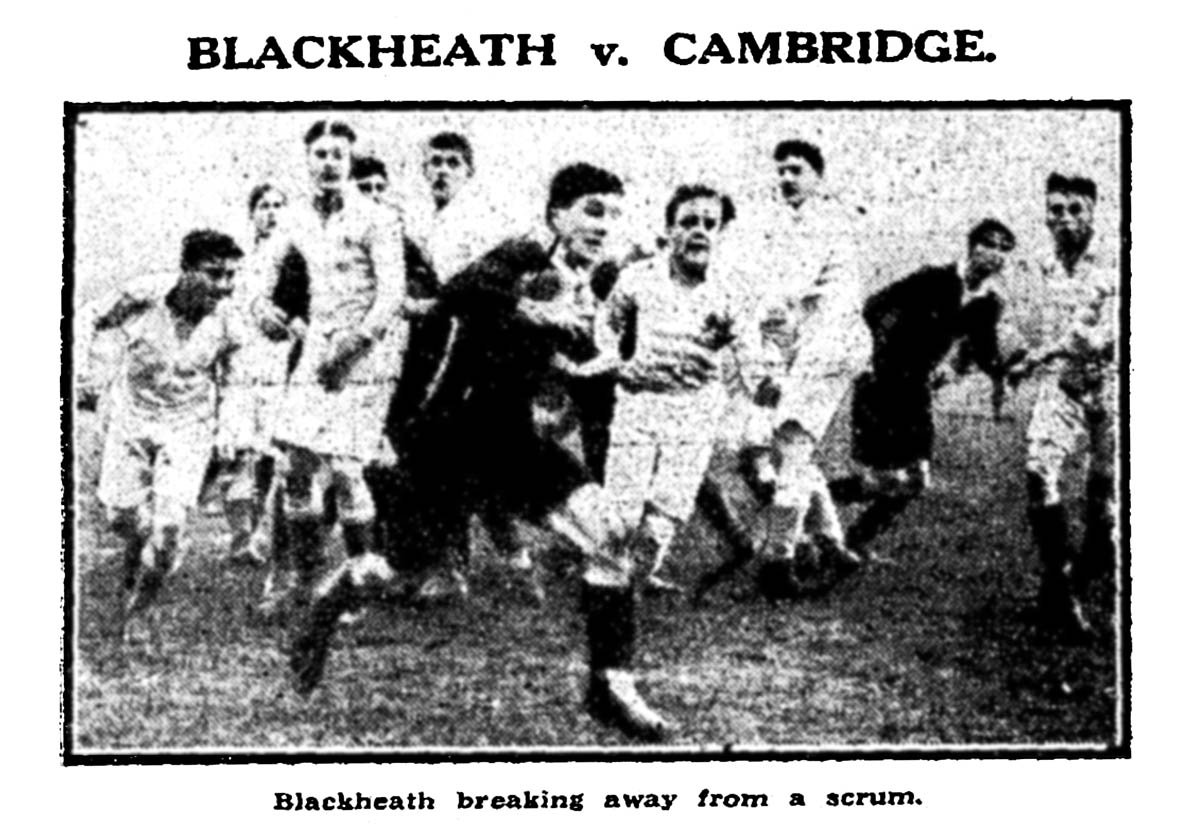The Daily Mail, November 17, 1913
A FINE TEAM.
——♦——
LIGHT BLUES FIND
THEIR FORM.
BLACKHEATH BEATEN
By P. G. WODEHOUSE.
Cambridge ... 8pts. Blackheath ... 6
Cambridge Ordinaries rose to par on Saturday and finished strong. By snatching victory from Blackheath in the last five minutes the Light Blues definitely established themselves as favourites for Queen’s Club. They are undoubtedly a great side.
At 2.45 on Saturday my feelings towards Cambridge were those of some father towards a prodigal son. I had seen them making chumps of themselves against the Harlequins, and I required definite proof that they had turned over a new leaf and meant to lead better lives. I am now prepared to slay the fatted calf without further hesitation.
The excitement began early, Pillman intercepting a pass in the first half-minute and only failing to score by inches. Scrummaging followed on the line, but the Cambridge pack soon showed that they had come on since the Harlequins match. From the very beginning they had the best of the forward duel. And that, with Blackheath in their present form, is going some. Greenwood is still the best hooker in the four Unions. Doherty, Maynard, and Symington were in great form.
The only flaw in the forward play of this year’s Cambridge team is a tendency to be weak at the line-out. It was from a line-out that Blackheath scored their first try at the beginning of the second half, Boyd dashing over in the corner.
Until then Cambridge had had markedly the best of the play. Although they had failed to score, Will had twice been brought down on the line, and once Lowe, picking up in the Blackheath ’25, had been held up when actually over. Nothing could have been prettier than the Cambridge combination that led up to these efforts. Cumberlege played a splendid game, and at last there seems to be a thorough understanding between him and Lewis. Thorne and de Villiers were excellent in the centre, but Lowe was the star performer. Some of his runs were dazzling. Imagine a rather small eel doing the hundred yards in about 9 3-5 and you get a rough idea of Lowe against Blackheath.
The only time after the first minute when Blackheath really became threatening in the first half was when King made a fine burst on the right and was tackled on the corner flag. On another occasion Blackheath reached the line through Watson intercepting a pass, but they did not look like scoring; and eventually Cumberlege found touch near half-way. Just before half-time Lewis only just missed a drop goal.
Two events paved the way for Blackheath’s opening try. King made a splendid run into the Cambridge ’25, and from the scrum which followed Cambridge lost more ground owing to Lewis, who is still too apt to kick instead of passing, having a punt charged down. Blackheath reached the line, where Lowe saved neatly and found touch. From the line-out Boyd (who was supposed to be marking him?) got over. Coverdale failed with the kick.
A magnificent run by Lowe to the Blackheath line set Cambridge attacking. Then Coverdale got off with a fine dribble. Cambridge touched down. Soon after the drop-out the Cambridge three-quarters got moving, but de Villiers gave a bad pass to Will, and Watson, nipping in and picking up, ran right through. Pillman, taking his pass on the line, scored. Coverdale missed a not very difficult kick.
From this point, though Wilson was badly hurt and eventually had to leave the field, Cambridge controlled the game. For a long time they did everything but score, and then with five minutes to go, after Lewis, Lowe, and Thorne in turn had been tackled on the line, de Villiers snapped up a pass from Lewis and ran in near touch. Cumberlege failed to convert.
The concluding minutes of the game were one thrill. Cumberlege found touch on the Blackheath line with a great kick. De Villiers got through and passed to Lowe, who grounded the ball, but was whistled back. At last with a couple of minutes to go Cumberlege whipped the ball out to Lewis, who handed on to Thorne, who broke through and scored a fine try under the posts. Greenwood converted, and a few moments later the whistle blew for no-side.

Editor’s note:
Norman Murphy points out the three Dulwich recent alumni (some ten years younger than Wodehouse) on the Cambridge team: Doherty, Greenwood, and Lowe. For more on Doherty and the previous week’s match against the Harlequins, see “A Blessing in Disguise”; for more on Greenwood and Lowe and the ’Varsity match at Queen’s Club, see “The Fascinating Mr. Lowe.”
 Madame Eulalie’s Rare Plums
Madame Eulalie’s Rare Plums